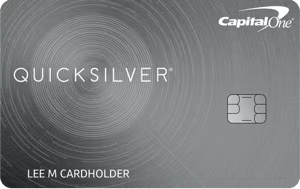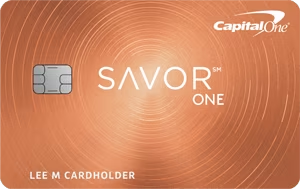Many credit card issuers offer cards designed specifically for college students with limited to no credit history. Student credit cards can help young adults build their credit, protect their money, and enjoy more spending flexibility than other payment methods allow while also earning rewards and perks when they spend. Plus, they have lower credit score requirements than most cards and better terms for new borrowers.
Here are a few of the best student credit cards to consider if you know you’re ready to take the next step with your money and start building credit.
Capital One Quicksilver Student Cash Rewards Credit Card
Best overall student credit card.
Capital One Quicksilver Student Cash Rewards Credit Card

Information about the Capital One Quicksilver Student Cash Rewards Credit Card has been collected independently by Money Under 30. Please confirm terms on the card issuer's website. Offer details verified on Apr. 29, 2024.
Welcome Offer
Earn a one-time $50 cash bonus once you spend $100 on purchases within 3 months from account opening.
Rewards
Earn 1.5% cash back on every purchase; 10% cash back on Uber and Uber Eats purchases (through November 14, 2024).
Annual Fee
$0 annual fee.
Our Thoughts
Students who meet eligibility and qualify for this credit card can take advantage of an early spend bonus, no annual fee and a straightforward rewards structure while building credit with responsible use. It's perfect for students looking for a pretty simple option.
Pros
- No annual fee
- No foreign transaction fees
- Unlimited 1.5% cash back on everything
- 5% cash back on hotels and rental cars booked through Capital One Travel
- Early Spend Bonus: Earn $50 when you spend $100 on purchases within 3 months from account opening
Cons
- High interest rate
The Capital One Quicksilver Student Cash Rewards Credit Card is one of the best student credit cards across the board. In addition to a great flat cash back rate of 1.5% on everything and a welcome bonus that’s better than most and pretty easy to qualify for, this card bakes in a lot of travel and everyday perks to help college students protect their money.
These include Travel Accident Insurance, Extended Warranty, and Complimentary Concierge Service. A lot of these benefits are things you’ll only see with costlier rewards cards you can only qualify for with good credit, but this card is meant for college students with fair credit scores. And although this card is exclusively for college students, you can keep it after you graduate.
Capital One Quicksilver Student Cash Rewards Credit Card is ideal for students who plan to use their credit card for most of their spending because there are no point caps. It’s also great for international students who want to avoid foreign transaction fees and save on travel. But because of its higher interest rate, it’s not ideal for students prone to overspending.
» MORE: Read our Capital One Quicksilver Student Cash Rewards Credit Card review
Capital One SavorOne Student Cash Rewards Credit Card
Best for dining and entertainment rewards.
Capital One SavorOne Student Cash Rewards Credit Card

Information about the Capital One SavorOne Student Cash Rewards Credit Card has been collected independently by Money Under 30. Please confirm terms on the card issuer's website. Offer details verified on Apr. 29, 2024.
Welcome Offer
Earn a one-time $50 cash bonus once you spend $100 on purchases within 3 months from account opening.
Rewards
Earn unlimited 3% cash back on dining, entertainment, streaming services and at grocery stores (excluding Walmart & Target); 10% cash back on Uber and Uber Eats (through November 14, 2024); 8% cash back on Capital One Entertainment purchases; 5% cash back on hotels and rental cards booked through Capital One Travel; and 1% cash back all other purchases.
Annual Fee
$0 annual fee.
Our Thoughts
College students who want to build their credit while earning rewards on popular everyday spending categories may find this to be a top option for a student credit card. Plus, you get to keep all the same rewards and benefits even after you graduate.
Pros
- No annual fee
- No foreign transaction fees
- Unlimited 3% cash back on dining, entertainment, popular streaming services, and at grocery stores
- 5% cash back on hotels and rental cars booked through Capital One Travel
- 8% cash back on Capital One Entertainment purchases
- Early Spend Bonus: Earn $50 bonus when you spend $100 on purchases within 3 months from account opening
Cons
- High interest rate
The Capital One SavorOne Student Cash Rewards Credit Card is one of the best student credit cards for students who spend a lot of money on food and experiences. It pays unlimited 3% cash back on dining and grocery store purchases plus up to 8% back on entertainment purchased through the Capital One Entertainment portal, so college students can save whether they’re staying in or going out. You’ll earn 1% cash back on everything else.
These categories don’t rotate and you don’t need to activate them. Rewards can be redeemed for a statement credit or check, gift cards, or to cover qualifying purchases on your statement. But unfortunately, this card doesn’t come with some of the credit-building benefits of other student credit cards like automatic credit line reviews or points boosts for on-time payments. You’ll still build credit, but you won’t have quite as much support.
» MORE: Read our full Capital One SavorOne Student Cash Rewards Credit Card review
Discover it® Student Cash Back Card
Best for college students looking to build credit.
All information about Discover it Student has been collected independently by MoneyUnder30.com. Content has not been reviewed or approved by the issuer. Unlimited Cashback Match on all cash back earned in the first year of card opening. Earn 5% Cash Back on everyday purchases that rotate every quarter. Rotating categories include purchases at restaurants, grocery stores, gas stations, and more (up to the quarterly maximum). Earn 1% Cash Back on all other eligible purchases. $0 Students will score big with this no-annual-fee card that earns a high rate of cash back on everyday purchases, all while building credit with responsible use. Offer details accurate as of 9/6/23Discover it® Student

Welcome Offer
Rewards
Annual Fee
Our Thoughts
Pros
- No annual fee
- No foreign transaction fees
- Up to 5% cash back on bonus categories that rotate each quarter
- Unlimited 1% cash back on everything else
- Dollar-for-dollar cash back match at the end of your first year
Cons
- 5% cash back capped at $1,500 spending per quarter
- 3% or 5% balance transfer fee
The Discover it® Student Cash Back Card is a solid rewards credit card for college students who are willing to put in a little more effort to earn more cash back. It pays up to 5% cash back on different categories each quarter, like grocery stores, gas stations, and Amazon. The catch is that you need to activate bonus offers and you’ll only earn 5% on up to $1,500 worth of spending. If you forget to activate and after you meet the maximum, you’ll earn 1% cash back.
At the end of your first year, Discover will match all the cash back you’ve earned dollar-for-dollar. There is no spending minimum required to qualify or limit on the rewards you can earn. You can also refer friends and receive an account bonus of between $50 and $100 each time. Discover won’t automatically review your account to determine if you’re eligible for a credit line increase like some of the other credit cards on this list, but you may qualify to borrow more after graduating with proof of income.
Discover it® Student Cash Back is one of the best student credit cards for students who know their own spending habits and have a little more experience with money management. With this card, it’s important for you to be able to remember the activate dates so you don’t miss out. If you aren’t comfortable with rotating offers or you know your spending will quickly exceed the quarterly limits, check out general rewards credit cards instead.
Benefits of student credit cards
There are many pros and cons to credit cards in general, but having a credit card as a college student offers many advantages. These include:
Safety — Credit cards are safer than debit cards and cash because they provide a buffer between merchants and your money. If someone hacks your account or gets ahold of your card, you won’t be responsible to pay for purchases they make.
Spending flexibility — Credit cards let you spend your money anywhere you go including online and overseas. They’re accepted almost everywhere and easy to keep track of. Many can even be used digitally and stored on your mobile device.
Savings — Rewards, cash back bonuses, and complimentary benefits can help you cut costs in just about every area of your life. And what college student doesn’t want to save money?
Build credit — Using a credit card is one of the easiest ways to steadily build credit. Almost all credit cards report your payment activity to the three major credit bureaus: Equifax, TransUnion, and Experian. This means that your credit card payment history will show up on your credit report and work in your favor if it shows on-time payments, showing that you’re a responsible borrower and making you more likely to be approved for credit in the future.
How to choose a credit card
Once you’ve made the decision to apply for a student credit card, the next step is to decide which one to apply for.
Credit card applications require a hard credit pull, which can affect your credit. Too many hard pulls can have a negative impact, especially on newer borrowers, and bring down your credit score because they can make you appear riskier to lenders. All this is to say that it’s important to choose wisely and not just apply for the first card you see.
You want to get a student credit card that most closely matches your spending habits and offers benefits you can see yourself using. Here are a few specific features to look at.
Credit score requirements
Most student credit cards have low credit score and income requirements. Many cards will approve applicants with fair credit scores, defined as a FICO score of between 580 and 669. A lot of new college students fall within this range. This means you may be able to qualify even if you’ve never applied for credit before and don’t have income, but it depends on the card.
Get your free credit score. This does not affect your credit and you should check your score often, especially before applying for a new card.
Annual fees
Annual fees aren’t common with student credit cards. But if you are interested in a card with a fee, keep in mind that you’re making a commitment to pay that fee every year you have the card. This may be worth it if you think the pros outweigh this con, but you could also be better off choosing a free alternative.
Rewards and benefits
It’s important to choose a credit card with rewards and bonus categories that make sense for the way you spend or plan to spend your money. For example, as a college student, you might be more likely to shop in grocery stores than you are to book hotels.
But cash back rewards and points aren’t the only benefits to pay attention to. Waived fees can help you save even more money. For instance, no foreign transaction fee cards are a good choice for international students who plan to regularly visit or make purchases from home and for college students who travel a lot.
Secured or unsecured
Consider a secured credit card if you want to practice good credit habits with less risk of taking on credit card debt. These credit cards require a refundable security deposit that you’ll get back if you close your account and they’re considered to be safer than traditional credit cards or unsecured credit cards.
Unsecured cards use your credit score, credit history, and income to determine your eligibility. Secured cards let you put down money instead. While unsecured student cards are designed to be safer than other unsecured credit cards, secured cards are safer still. But which one is right for you depends on your confidence in your money management skills.
Welcome bonuses
Never make the decision to apply for a credit card based solely — or mostly — on a credit card sign-up bonus. While extra cash never hurts, especially when you’re in college, a welcome offer won’t continue to benefit you. Ongoing rewards and benefits will.
Welcome bonuses also shouldn’t be treated as dealbreakers unless they’re the only difference between two credit cards, which is almost never the case.
How to apply for a credit card
You shouldn’t apply for a credit card until you’re sure you’re up for the responsibility.
There is no perfect age for everyone to apply for their first credit card, but entering college is a good time for a lot of people. You’ll know you’re ready for a credit card when you trust yourself to keep your spending under control. This requires different amounts of practice for different people.
When you’re ready but before you submit an application, check to see if your chosen card will let you see if you prequalify first. Prequalification can let you know if you’re likely to be approved for a card with a soft credit pull instead of a hard pull. Soft pulls don’t hurt your credit.
Next, select the card you want and begin the application. You’ll need to provide personal information including your full legal name, permanent address, and Social Security number. You’ll also share your income (if any) and employment status. For student credit cards exclusively for those in college, you may need to verify that you’re attending college full-time as well.
Some credit cards will give you an instant decision after your application has been received, but this depends on your responses and the card you’re applying for. You may instead see a message letting you know that your application will need to be manually reviewed to determine if you’re eligible. This doesn’t mean you’re going to be denied, it just means someone is going to take the time to go through your application to make sure you’re a good fit. This usually takes anywhere from a few business days to a week.
How to use credit cards responsibly
If anyone has ever told you to avoid credit cards at all costs, it’s probably because they’ve had experience with the negative effects of poor credit card use. But credit cards can be incredibly beneficial if you know how to use them.
Using a student credit card responsibly means understanding the impacts of your activity — good and bad. On the most basic level, you’ll need to know that paying off your debt will help your credit, and carrying a balance, missing payments, and not paying off your debt will really, really hurt it.
Missed payments can cause you to be charged interest and penalty fees, and they also end up on your credit report and take years (seven, to be exact) to clear. All of this makes it harder to get out of debt and get approved for new credit when you need it, like car loans and mortgages.
Here are some tips for using a credit card safely to avoid debt and damage to your credit:
- Pretend it’s a debit card and only spend money you already have.
- Schedule automatic payments for the full balance, not just the minimum payment. Only making minimum payments will require you to pay interest on the rest of your balance.
- Track your spending and get good at using your credit card to budget.
Summary
Student credit cards offer a low-risk way for college students to build credit and earn rewards on money they would be spending anyway. Many also come with benefits like purchase protection and waived foreign transaction fees to help students save and make their lives just a little bit easier.
But don’t apply for your first credit card until you’re confident in your abilities to keep your spending in check. When you’re ready, check out these six best student credit cards.

